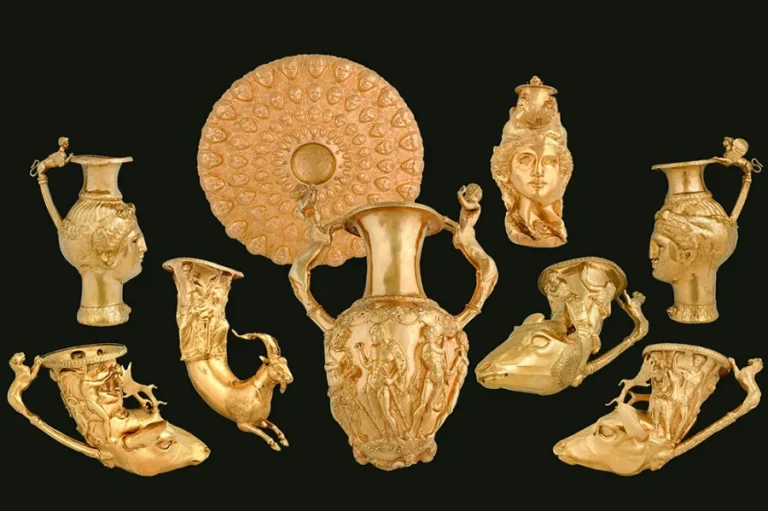
The Panagyurishte-Treasure. Photo: © Todor Dimitrov/National Museum of History, Sofia
In the mid-fifth century BC, an Athenian nobleman returned home from a diplomatic trip carrying a pair of peacocks – probably a gift from a Persian ruler. Few in Athens had seen such curious birds, and the city was soon in the grip of peacock mania. As the most zealous attempted to steal the eggs, Pyrilampes, better known as the stepfather of Plato, did his best to temper the craze by opening his aviary just one day a month.
This major new exhibition at the British Museum, dedicated to Greek and Persian luxury between the Graeco-Persian Wars of the fifth century BC and the death of Alexander the Great in 323 BC, features a charming bronze of a peacock being fed fruit by a pretty young woman.
For many Greeks, such presents typified the wantonness of the East, a decadence they loved to hate but by which they couldn’t help but be captivated. Meanwhile, from the Persians’ perspective, lovely things were not morally compromising but physically empowering, for they could be used to forge friendships across borders.
Juxtapositions in the exhibition reveal the ways that the Greeks tried to emulate the objects they discovered: a Persian gilt-silver rhyton (a vessel used to serve wine) with a winged griffin (c. fifth century BC) finds an echo in a Hellenistic-era drinking cup in the form of a lion’s head (c. 500–470 BC); that items associated with the Persian royal court such as parasols were adopted by Greek culture is revealed here by the illustration on an ornate hydria (c. 400–380 BC).
Other highlights include the Panagyurishte Treasure, on loan from the National Museum of History in Bulgaria. Consisting of nine gold vessels and eight rhyta, these finely decorated golden objects exemplify the precision of Persian craftsmanship. Find out more on the British Museum’s website.
Luxury and Power: Persia to Greece is at the British Museum from tomorrow until Aug 13. Tickets: 020 7323 8181; britishmuseum.org